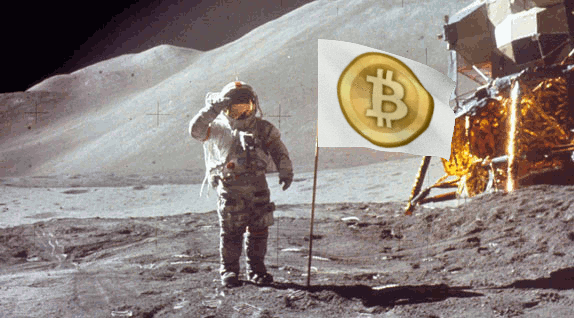
Photo credit: Giphy.com
Recently, a couple of adventurous Bitcoin enthusiasts attached a paper wallet to an air balloon and tried to send it into space. Once it reached an altitude of 20km, they sent one Bitcoin to the paper wallet, thus making it the first peer-to-peer transaction at that altitude. They even beat their own record by sending another Bitcoin at 33km.
Unfortunately this experiment didn’t actually manage to send Bitcoin into space. Fédération Aéronautique Internationale, the governing body for aeronautics, puts the beginning of space at 100km. But it illustrates quite effectively the ease of transacting bitcoins may even have in space.
Having grown up with mainstream sci-fi shows like Star Trek and Star Wars, I’m excited that human colonization of space might finally begin; not tomorrow, but soon.
The future of space commerce
Imagine a world where Uber rovers transport people from SpaceX’s station in Mars to NASA’s station, or where Amazon has an express delivery to other planets. Within a decade, companies will no longer limit themselves to being the best in the world but aspire to be the best in the universe.
Sending this Bitcoin into space is like opening Pandora’s box: once unleashed, it can never be unthought. The idea of space entrepreneurship might seem farfetched now, but a few years ago self-driving cars or startups attempting to colonize Mars would’ve seemed crazy too. We all know that an idea can change the world, but maybe soon ideas will start changing the universe.
Due to the nascent aerospace industry, commerce in space has never really been explored in earnest. Even a Google search of “commerce in space” returns absolutely nothing relevant. This may be because not many companies operate in space, which makes transactions usually happen on Earth.
But in our future, where there will be several companies operating on the moon or in Mars, it would be necessary for parties to make monetary transactions in space using a different set of standards.
For this, a payment infrastructure and banking system has to be developed from scratch, and anything linked to fiat currencies would be too archaic and restrictive. Moreover, the effort it takes to consider movement of any fiat currency outside earth would be too arduous. This would undoubtedly slow down space exploration by several years.
Bitcoin’s place in space
The complexities of transactions in space might be the perfect opportunity for Bitcoin, the epitome of decentralization, to swoop in and save the day.
Bitcoin may still take several years to replace our existing banking systems. However, a brand new one for space will most definitely be built on the decentralization and interoperability of Bitcoins, and will redefine how we view money altogether.
Most breakthrough achievements throughout time have been born from nothing but a simple crazy thought. Experiments like these might appear to be insignificant, but they are the sparks that ignite new ideas, pushing us to sit down and think.
We can only imagine a fraction of the endless possibilities that this might have opened up. Quoting a colleague of mine, “What a time to be alive.”
Disclosure: Mriganka Pattnaik is the growth/business developer at BitX.








